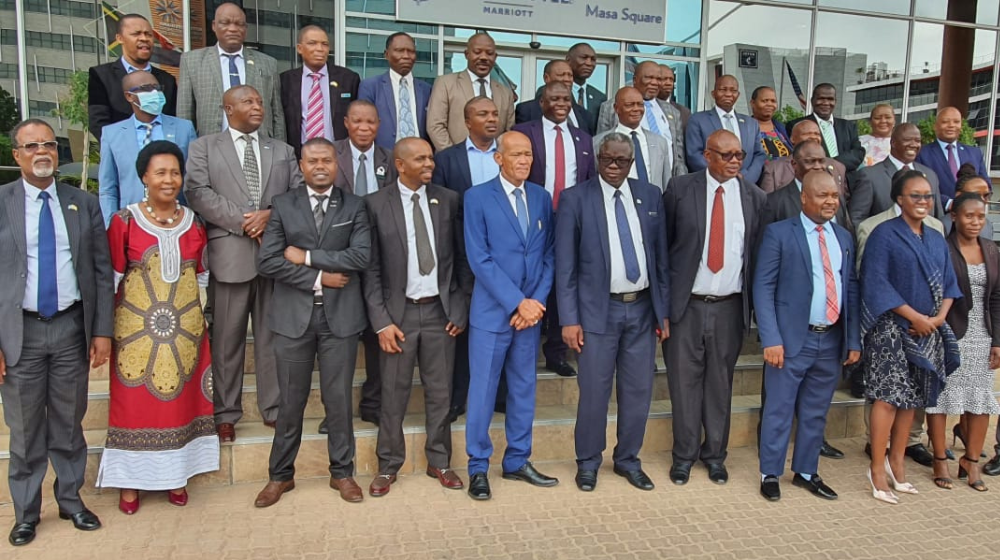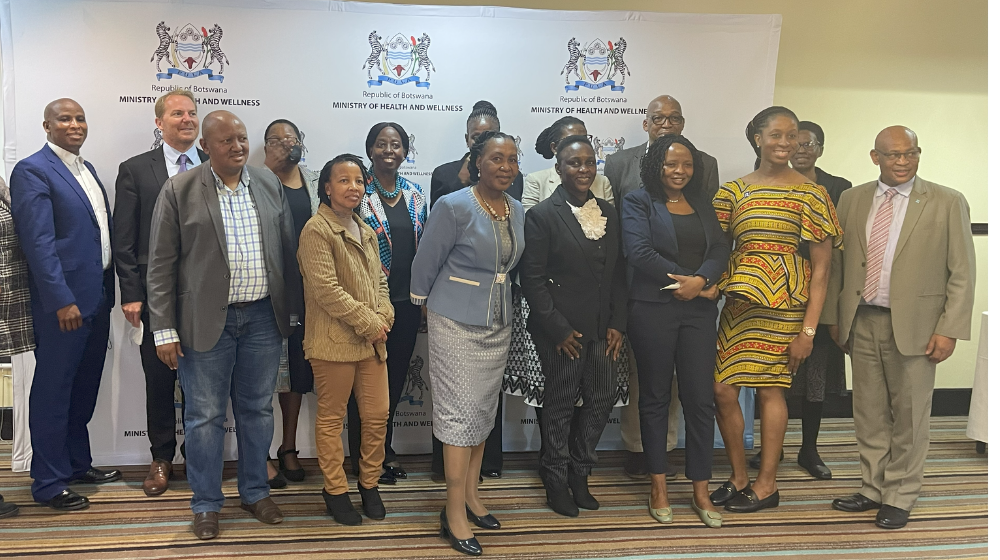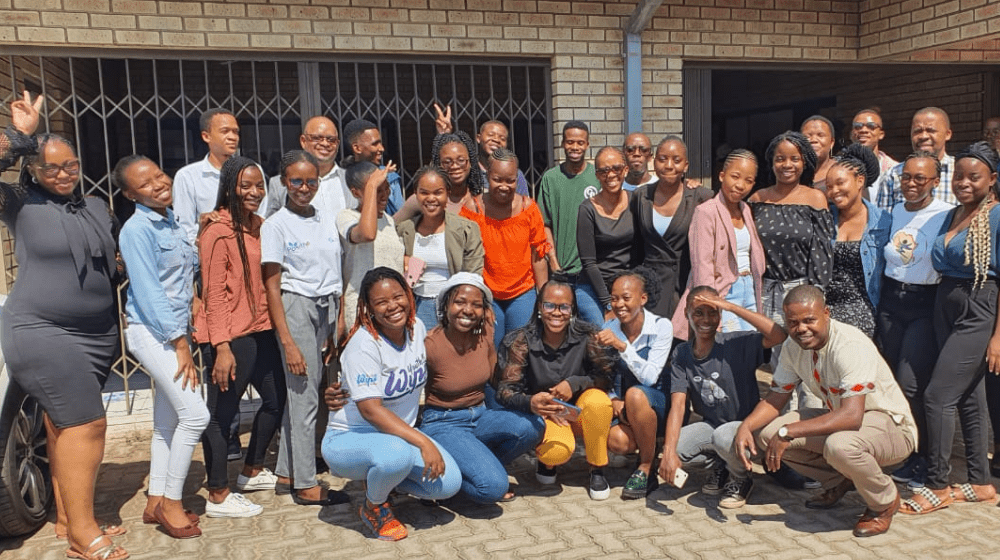Gaborone, Botswana- Expanding the range of safe, affordable, and high-quality contraceptive methods available to women and girls is key to the fulfillment of their sexual reproductive health and rights (SRHR). Reproductive choice is one of the most fundamental human rights and ensures that women everywhere have the freedom and ability to lead healthy lives and make their own informed decisions about contraception and whether or not to have children. Family planning prevents maternal and child deaths and the spread of HIV, including mother-to-child transmission of HIV and other STIs. It further empowers adolescents and young people to lead productive lives by preventing teenage pregnancies and availing themselves of development opportunities.
In an effort to continue its commitment to advancing rights-based family planning and to invest in transformational progress for its citizens, the government of Botswana, through the Ministry of Health with support from UNFPA, conducted national stakeholders consultative meetings to inform the finalization of Botswana’s FP2030 commitments in line with national priorities and UNFPA’s transformative agenda of accelerating progress towards ending unmet need for family planning. These consultations were supported by experts from the FP2030 East and Southern Africa Regional Hub.
Noting that family planning access demands a collective national approach, the consultations brought together various stakeholders, including members of parliament, traditional leaders, young people, civil society organizations, and government departments, presenting an opportunity to promote cross-sectoral partnerships to place family planning at the center of the national and global development agenda.
Consultations with young people

© UNFPA Botswana
The consultation with young people was held under the auspices of the SRHR Africa Trust (SAT), a youth-serving organization focused on advocating for SRHR for adolescents and young people. A total of 32 young people attended the consultation, representing young mothers, young people living with HIV, boys and young men, adolescents, girls, and young women, in- and out-of-school youth, and young people with disabilities.
To culminate the consultation, young people reviewed the four draft FP2030 commitments and provided clear guidance on improving them. Of key importance is that they suggested an additional commitment specifically focusing on reducing early and unintended pregnancies among adolescents and young people.
One of the key recommendations they made was to ensure programs adequately build agency among adolescents and young people, particularly among girls, so they can adopt positive sexual behaviors and reject negative and harmful practices that undermine their bodily autonomy.
Consultations with traditional leaders- Members of Ntlo Ya Dikgosi (House of Chiefs)

and UNFPA © UNFPA Botswana
The Chairperson of Ntlo Ya Dikgosi, Kgosi Puso Gaborone provided compelling remarks with participants on the pivotal need for their involvement in SRHR matters. In his deliberations he highlighted that as leaders, they interact daily with members of the community without interruption, therefore it is critical to consult with them. One of their role is to promote the welfare of their communities, including in health and other sectors. He appreciated that the information on SRHR places them in a better position to advocate for these issues and talk openly and comfortably with their communities. He reminded the house that as the Ntlo Ya Dikgosi, they are part of the legislative arm of government, advising on laws and policies and providing an oversight role, therefore they all need to take the issues of Family Planning, Early and Unintended Pregnancies and the wider SRHR as priorities and lead the conversations in their communities. He concluded by pledging their unwavering commitment to partner with MoH and UNFPA and advocate for and speak up about SRHR issues, including during the implementation of the FP2030 Commitments.
Participants were taken through the status of SRHR in the country, the background of the FP2030 Global Partnership and Draft FP2030 Commitments before reviewing them. They acknowledged the importance of speaking about SRHR issues in their communities, but noted that they require capacity building on these issues to ensure they relay correct information. They also acknowledged that indeed harmful practices such as child marriage happens in some of their communities, which in turn leads to early pregnancies among adolescents and young people. They recommended that MoH and UNFPA to work with religious leaders who often are barriers to access to family planning and that harmonization of laws is required to create a clear path for justice for adolescents and young people.
The members of the Ntlo Ya Dikgosi endorsed the commitments and appreciated their multisectoral nature. They proposed an additional strategy under the commitment on Access to Family Planning on building strategic partnership with traditional leaders at community level.
Consultations with Members of Parliament
Members of Parliament were briefed on the FP2030 global partnership, the status of SRHR in the country, and the draft FP2030 commitments. The parliamentary committees that participated in the briefing were the Women's Caucus, Health, and Youth and Sport portfolios. They welcomed the FP2030 commitments as long overdue given the various challenges that parliamentarians are confronted with in their constituencies, such as the high number of early and unintended pregnancies among adolescents and young people. They underscored that unwanted and early births alter a young girl's future course, and that there are many hurdles to the girl returning to and completing school.
They agreed that the commitments are well-thought-out and endorsed them, emphasizing the importance of generating the much-needed political will and funding for SRHR. They underscored that the bad SRHR indicators will endure until the government devotes resources to SRHR and encouraged the task team to seek an audience with the National Assembly to ensure that all members have been adequately briefed and can advocate for the inclusion of the FP2030 commitments in sectoral plans and subsequent national development plans.
We have adequate policies. The big issues are access, choice and equity; therefore ensure that the commitments are backed with resources/ financing- Hon Unity Dow, Parliamentary Caucus on Women
Consultations with the FP2030 High level Steering committee

© UNFPA Botswana/Priscilla Rabasimane
To ensure a thorough consultation and review by all relevant stakeholders, a high-level steering committee was established, comprising directors of departments from key line ministries (Health, Education, Youth & Gender, Local Government, Finance, Statistics Botswana) and heads of NGOs and civil society organizations. The committee provides oversight for the FP2030 commitment processes and acts as the final endorsement body for the commitments before submission to the Permanent Secretary.
After all committees endorsed the amended commitments, the team presented the final draft to the MoH Permanent Secretary, Ms. Grace Muzila, and other senior government officials. The Ministry of Health will advocate for the inclusion of the FP2030 commitments in the upcoming National Development Plan 12.
Next steps:
- Engage with the relevant departments and ministries to close the outstanding gaps in the commitments
- Brief the National Assembly and the Ministerial Performance Improvement Committees (committees of Permanent Secretaries of all ministries) on the draft FP2030 Commitments.
- Development of the Costed Implementation plan.
- The commitments will be launched in June 2023.
About FP2030
FP2030 is the only global partnership centered solely on family planning and aims at bringing together the widest possible range of partners across disciplines and sectors, while situating family planning at the crossroads of global health, development, and gender equality agendas.
It is the successor to FP2020, that ran from 2012 to 2020. Over the course of those years, FP2020 emerged as the central platform for family planning. Ten years after the implementation of the FP2020 commitment, global commitment to family planning continues from FP2020 to the new Partnership FP2030, where countries can learn from good practice and build on each other's strengths to achieve right-based, inclusive, transparent and country-led family planning commitments and to achieve sustainable development goals (Sustainable Development Goals).
For more information, please visit https://fp2030.org/
About UNFPA
UNFPA, the United Nations Population Fund, works to deliver a world where every pregnancy is wanted, every child birth is safe and every young person’s potential is fulfilled. Since 1971, UNFPA has been one of Botswana’s most prominent partners in reproductive health, youth, population and development, and gender equality.
UNFPA strives to achieve three transformative results also known as three zeros, a global commitment to end preventable maternal deaths, unmet need for family planning, and gender-based violence and harmful practices, guided by the 1994 International Conference on Population and Development (ICPD) and Sustainable Development Goals (SDGs) 2030 Agenda.
For more information, please visit https://botswana.unfpa.org/
Media Contacts:
Priscilla Rabasimane | Communications & Partnerships Analyst | UNFPA Botswana | Tel. +267 3633752 | e-mail: rabasimane@unfpa.org


